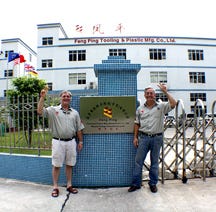Chinese shop, American style, global success
After four months of searching, negotiating, and cajoling, John (below left) and James Fiocchi had rescued all 575 of their tools from six former Chinese vendors. Surrounded by pallets loaded with enclosure tools and their 1200 inserts, the brothers, half a world from their Chicago-area homes, faced a life-altering, “Now what?” moment.
September 30, 2010
After four months of searching, negotiating, and cajoling, John (below left) and James Fiocchi had rescued all 575 of their tools from six former Chinese vendors. Surrounded by pallets loaded with enclosure tools and their 1200 inserts, the brothers, half a world from their Chicago-area homes, faced a life-altering, “Now what?” moment.
It was 2008, and the Fiocchi brothers, after nearly 20 years of sourcing from China for their enclosure businesses, realized that they had lost control of their supply chain and faced a potentially disastrous production disruption. Fast forward to the summer of 2010, and the Fiocchis run a wholly owned moldmaking and molding shop in China, with a burgeoning assembly business and a compelling pitch to Western customers: the China price from a shop built and run with an American style.
|
Back in 2008, the Fiocchis journeyed to southern China not to start a new business but to reclaim their enclosure operation’s tooling shop by shop, arriving in Feng Gang, a fast-growing factory city just outside Shenzhen. Their tools were scattered among numerous molders, many of which had changed names and owners over the years. Four months after the rescues began, they were finally complete, and the Fiocchis rented the 8000-ft2 ground floor of a three-story factory in Feng Gang to store their reclaimed tooling.
The brothers initially decided to hire a local production manager. Several bad business relationships later, they were back where they started and frustration prompted two decisions: They would create their own wholly foreign-owned enterprise, and they would learn Mandarin.
Within two weeks, the Fiocchis had built a fully functioning molding/moldmaking operation. Called Feng Ping (“phoenix with a calm wind”) after the street it was on, the company started with a staff of 19, most recruited from the brothers’ long-time contacts in China as they poached the most talented individuals they had worked with over the years.
After three months, Feng Ping had caught up on its backlog, and within another two, it had run a year’s worth of product. An idle plant and a chance encounter back in the U.S. prompted the brothers’ next big decision to sell their spare capacity. They began actively promoting it in June 2009 and garnered a nearly overwhelming response. Taking turns, with one brother at the factory and the other at home or barnstorming across the U.S. on calls, Feng Ping delivered more than 160 tools last year.
Given the booming business, Feng Ping moved into a new 85,000-ft2 building in November 2009 staffed by 185 working two shifts. The three-story structure houses moldbuilding and molding on the ground level, with offices and EDM operations on the second, and the start of an assembly business on the top level. Across the parking lot, a five-story building houses a full-service kitchen/cafeteria and weight room, employee dorms, and suites for plant visitors.
Moldmaking currently takes up most of Feng Ping’s business, with an average monthly build of 35 tools and capacity for 50. Growth is rapid enough that the firm was looking at leasing the adjacent mirror-image building, thanks to Q1 2010 sales that eclipsed all of 2009’s. When MPW visited, Feng Ping was running 12 molding machines, 88-268 tons, with a 550-ton Haitian on order to assist with mold trials, plus an additional CNC en route.
John (46) and James (49) hadn’t planned on launching a China-based company at this stage in their lives, but like their business plan, they’ve adapted quickly, and the result is a plant that mixes east and west. Example: The cafeteria serves traditional foods cooked fresh by six full-time chefs, with cafeteria tables featuring built-in burners for regional hot-pot cooking; but on weekends one of the brothers mans a grill they shipped over for American-style barbecues, and, in a country notorious for warm (by U.S. standards) drinks, the Fiocchis have reserved a shelf in the cafeteria refrigerator for chilling beers to a frosty exterior.
Looking back, the brothers admit it’s been a long, strange, and rewarding trip. “It’s been 17 years of banging your head against a wall,” James says, “and three years of owning your own business.” —Tony Deligio
About the Author(s)
You May Also Like



